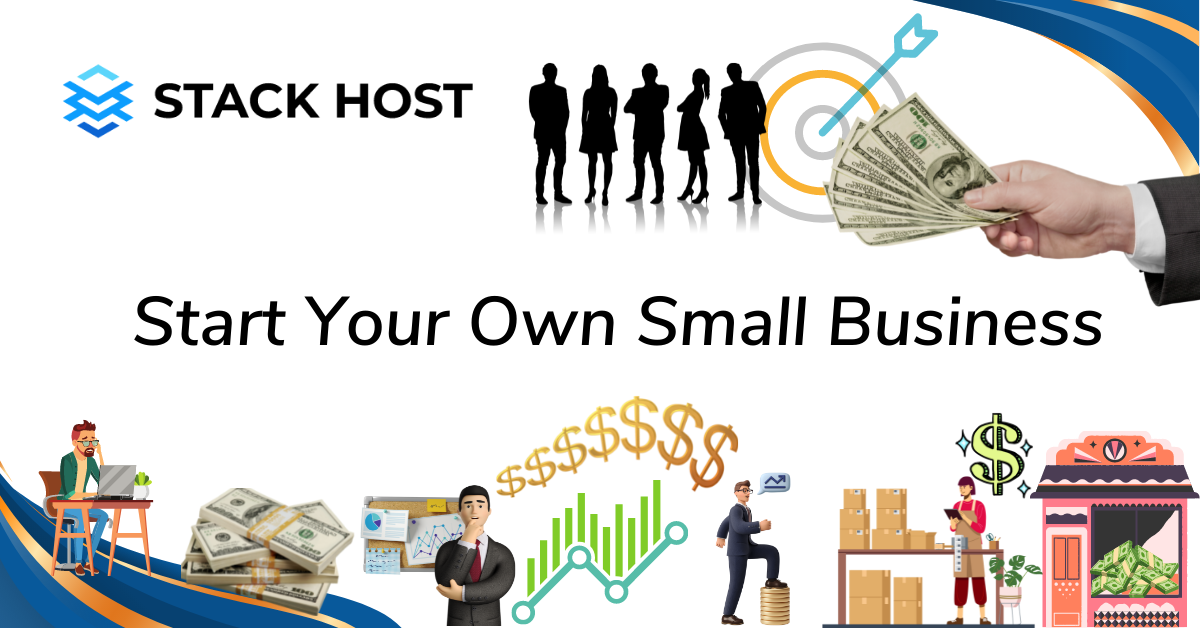Small businesses are the backbone of many communities and thrive in today’s economy. More people are creating their jobs — and business can be a great way to gain financial independence and pursue your interests.
A small business has few employees and sells products or services. It is also called a micro business, micropreneur, or micro venture. Small business has some advantages over larger companies when starting since there are fewer upfront costs.
And even though you will not have the same resources as big corporations, there are plenty of ways to launch your own small business without breaking the bank.
Starting Your Small Business? Here are 11 Pro Tips for You!

1. Research Your Small Business Idea
You won’t know if your small business idea is a good fit unless you research it. The first step is to check if there is a market for it — how many people is it for, and are they willing to pay for it? Do some research to see if your idea is viable and if it’s something people are willing to pay for. If you’re unsure where to begin, read articles about the idea and search for related keywords on Google Trends.
You can also use websites like Reddit to ask for feedback from industry experts. Once you have an idea of how many people are interested in your business, you can do more research to find out if there is enough of a market to sustain it.
You don’t want to go too far into the planning stages without determining if your idea is viable. To do that, you’ll want to start by researching your competition. What do they offer that you don’t? And what can you do to set yourself apart from the rest? You can use Google AdWords for Business to determine who is currently advertising your topic or product. You can also use Google Trends to discover what products or services are trending.
2. Know your audience
For any new business, creating a marketing plan is essential. One of the first steps is to define your target audience. This includes not only who is buying your products or services but who is providing them. Understanding these groups will help you create a marketing strategy to reach them and help you decide what type of products or services to offer.
Once you better understand where your customers are, you can create marketing strategies to help you reach them. Developing marketing strategies may involve advertising, social media, or public relations, depending on your business type. If you’re not sure where to start, here are a few ways to define your audience:
- Demographics
- Gender, age, life stage, family size, and education level
- Psychographics
- Values, interests, and activities
- Behaviors
- What does your ideal customer does when they go online, where they shop, and how often do they shop?
3. Decide on a product or service
One of the first decisions you’ll make as an entrepreneur is what type of product or service you want to offer. There are many types of small businesses, including online, service, resellers, and product-based companies. No matter what kind of business you start, there are a few questions you should ask yourself before making a final decision:
➤ Does it solve a need?
➤ Is it something people want or need?
➤ Can you create a product or service different from what’s already out there?
➤ Are there enough people with the need you’re trying to solve?
➤ Does it fit your personality?
If you answered “no” to any of these questions, you might want to reevaluate the type of business you start.
4. Decide on your business structure and name
Before starting a small business, you’ll need to decide on a business structure. There are a few kinds of small business structures, including a sole proprietor, partnership, corporation, or limited liability company (LLC).
You also need to decide what your business name is. There are a few things to keep in mind when choosing a name:
❑ Make it memorable
❑ Make sure it isn’t being used by another business
❑ Make sure it isn’t trademarked by another business
❑ Make sure it isn’t grammatically incorrect
❑ Is it easy to spell?
❑ Does it accurately reflect your business?
There are some online tools you can use to help you come up with a name.
5. Know Your Strengths and Weaknesses
Before starting your small business, you must know your strengths and weaknesses. For example, maybe you’re great at coming up with new ideas but aren’t very good at marketing them. Or perhaps you have a knack for sewing or baking but don’t know what to charge for your services.
You should consider your strengths and weaknesses when deciding what product or service to offer. This could help you decide what type of business to start. For example, if you’re great at designing websites but are not very creative in coming up with new product ideas, you could decide to create a website design business. This way, you can use your strengths to help other businesses with their marketing efforts.
6. Research Your Competition

Before you start any marketing campaigns, you want to get a good idea of your competition. This will help you decide what marketing tactics you want to use and what type of products or services you wish to offer.
For example, if you decide to start a bakery, you’ll want to know what other bakeries are around you and what they offer. You can discover this information in a few ways:
➡️ Visit your competitors
➡️ Visit their websites
➡️ Read reviews about your competitors
➡️ Attend local business events
➡️ Attend industry events
➡️ Join industry groups and forums.
Once you have all this information, you can decide what type of products and services you want to offer and how you want to advertise them.
7. Create a budget and plan your marketing
Once you decide what type of marketing campaign you want to launch, you have to determine how much you have to spend. You don’t want to go into debt, but you also don’t want to ignore your marketing efforts and lose potential customers.
When planning your marketing budget, a good rule of thumb is to spend about 10% of your projected revenue. That way, you can create some marketing campaigns without breaking the bank.
Once you know how much you can spend, it’s time to decide what marketing tactics you want to use. There are many ways to market your business, including social media, email marketing, blogging, PR, and trade shows. You can also try a combination of these strategies.
8. Registering your small business
Depending on the type of business you start, you may need to register your business with the government. If you have employees, you may need to file taxes and have your business be an official corporation. If you sell products, you may need to register your business as a corporation or sole proprietorship. If you offer services, you may need to register as an LLC or sole proprietorship.
Some industries also have their own licensing requirements. If you’re not sure where you should register your business, you can find information online or talk to a government representative. You may also want to talk to an attorney or financial advisor to ensure you comply with all government regulations.
9. Build your website or app (or both)
For many businesses, the first step is creating a website or app. Depending on your industry, you may want to build both. If you’re not a tech person, you can outsource this work to freelancers or hire a web design agency to create a site or app for you.
Many services offer website and app building, either for a one-time fee or a monthly subscription. These services may also help you create an online store to sell your products directly to customers. You can also create your website or app on your own.
Many do-it-yourself website-building tools, including Squarespace are available. If you dont know where to start reach our to a web design expert at Stack Host for a free small business web design consultation. Stack Host helps small business owners setup, launch and maintain their website with little effort.
10. Find the funding you need for your small business

If you have come this far, you have probably already decided that starting your own business is your best option. So, now you need the funding to make it happen. Luckily, there are many ways to get funding for your business. Some people use their savings and credit cards to finance their business, while others get investors or a loan.
You may also want to consider getting a small business loan. You can talk to a business advisor if you need help deciding how to fund your business. They can help you come up with a plan and find the funding you need. While there are many ways to fund your business, make sure you understand all the terms and costs and have a backup plan if something goes wrong or your funding is cut short.
11. Run a marketing test before launching
If you plan on launching a new product or service, running a marketing test before you launch the product can be helpful. This will help you get a feel for what your marketing strategy is going to be and the type of customers who are interested in your product. It will also help you figure out what kind of marketing you should do to get those customers interested and purchasing your product.
This marketing test can be as simple as posting flyers in your community, advertising on social media, or sending out a few emails. This is a great way to get your product out there and initial sales.
If you need help with marketing, hiring a marketing agency can help take care of marketing and marketing-related tasks. They can help with anything from digital marketing to PR, content creation, email marketing, and more. Marketing
???? 6 Reasons Why Starting Your Own Small Business Is The Best Decision You’ll Ever Make ????

Starting your own small business is the best decision most people will ever make. It offers freedom and control like no other job or internship can. Read on if you’re thinking about starting a small business and launching your own company.
You might be ready to take that leap of faith and become an entrepreneur. Here are 6 reasons why starting your own small business is the best decision you’ll ever make:
???? You’ll be in charge of your own destiny.
When you work for someone else, you’re at their mercy. Your livelihood is wholly controlled by your boss and the company you work for. However, when you go out on your own, it’s your job to earn the money you need to pay the bills.
You’re responsible for your own success. You don’t get paid if you don’t do what it takes to make money and succeed in your own business. This is an essential factor because it allows you to control your destiny. This is something that most people who work for other people will never get to experience.
It’s a great feeling, knowing that if you put in the effort, you’ll get a good return. You won’t get paid if you don’t do what you need to do to be successful. This is a really cool aspect of running your own business, as it gives you a natural feeling of responsibility.
???? You’ll build incredible confidence that will serve you for life.
Starting a company and growing it into a successful brand takes a lot of courage and confidence. As you launch your business and begin to make sales, you’ll gain more and more confidence in yourself and your abilities. You’ll learn to trust yourself and your instincts.
You’ll learn to ignore the haters and push on with your goals, no matter how hard things get. This confidence and courage will serve you for life and is something you won’t get from any career training or university degree.
Confidence is one of the best and most valuable assets you can have as a human being, and starting your own business is the easiest way to build it. You’ll also meet people who will see your confidence and courage along your journey. They’ll want to work with you, buy your products, and partner with you because they’ll see your unique brand of strength. This will help you grow your business and take it to the next level quickly.
???? You’ll be free to work on the things you care about most.
One of the biggest complaints you hear from people who work traditional 9-5 jobs is that they don’t have any control. They are forced to work on things they don’t care about, have no say in the direction of their company, and are told when to take a vacation and when to work overtime.
When you run your own company, you get to decide what products you want to sell, where you want to sell them, and how to get them to your customers. You can work when you want, where you want, and on the stuff that you want to work on. You can decide how many hours you want to work and when you want to take a vacation. This is one of the biggest perks of running a business. You get to control every aspect of your business, which gives you total freedom to work on the things you care about most.
You can create a small business that works around your other commitments, like school or family. You can work on things you’re passionate about, making the work easier and more fun. This is something that most people who work for other people will never experience, which is a huge bonus of being an entrepreneur.
???? You’ll learn skills that no university or college could ever teach you.
As an entrepreneur, you’ll learn skills that no university or college could ever teach you. You’ll learn how to market your business, how to sell your products, how to manage your finances, how to hire and fire people, and how to deal with customers who are having problems with your products.
You’ll learn how to set goals and achieve them. You’ll learn how to deal with failure and rejection and how to bounce back and try again. These are skills that university and college can’t teach you.
Running your own small business is the best way to learn these skills. You’re forced to figure them out and put them into practice, which is the best way to learn anything. You’ll have to make mistakes, try new tactics, and fail a few times before you succeed. This is the best way to learn and grow as a person, which is why starting your own business is the best way to learn new skills.
???? Starting your own business is riskier than most jobs, but the payoff is worth it.
When you start your own small business, you’re taking risks that very few people are willing to take. You’re investing your money, you’re investing your time, and you’re taking on all the risk of being successful or failing. This is a huge commitment, which is why most people don’t do it. However, if you do it right, the payoff is worth it.
When you work for a company, the risk is on them, not you. They provide the funding, they take on all the risk of the business failing, and they are the ones who decide if your job is secure. When you’re an entrepreneur, all the risk is on you. You have to fund your company, work long hours to make sure it succeeds, and decide if your employees’ jobs are secure.
However, the payoff is huge when you take that leap of faith and launch your own business. You get to keep the majority of the profits from your sales, you get to do something you love, and you get to work on the things you care about most. Starting your own business is riskier than most jobs, but the payoff is worth it.
???? There are so many benefits to working for yourself instead of someone else.
There are so many benefits to working for yourself instead of someone else, but most people don’t do it. They get a regular paycheck, work around 40 hours a week, and then go home and do whatever they want. They might get a vacation once a year, but they have no real freedom or control.
Entrepreneurs work many hours, they don’t get paid unless they work, and they don’t have set hours. They work whenever they have a chance to make progress, which means they don’t get to spend as much time with their family and friends as people who work regular hours do.
However, the benefits of being an entrepreneur outweigh the negatives when you look at the big picture.
- You get to keep all of the profits from your sales.
- You also get to work on the things you care about most.
- You get to control your own schedule.
- You get to take risks.
- You get to learn new skills.
- You get to build confidence.
There are so many benefits to working for yourself instead of someone else.
Starting your own small business is the best decision most people will ever make. It offers a sense of freedom and control like no other job or internship can. When you launch your own company, you get to decide what products you want to sell, where you want to sell them, and how to get them to your customers. You get to control every aspect of your business, which gives you total freedom to work on the things you care about most. You learn skills that no university or college could ever teach you. Starting your own small business is not easy, but these tips and tricks will help you along the way.





